-
 Bitcoin
Bitcoin $114400
0.68% -
 Ethereum
Ethereum $3550
2.48% -
 XRP
XRP $3.001
4.99% -
 Tether USDt
Tether USDt $0.9999
0.01% -
 BNB
BNB $757.6
1.46% -
 Solana
Solana $162.9
1.07% -
 USDC
USDC $0.9998
0.00% -
 TRON
TRON $0.3294
0.91% -
 Dogecoin
Dogecoin $0.2015
2.46% -
 Cardano
Cardano $0.7379
2.01% -
 Stellar
Stellar $0.4141
8.83% -
 Hyperliquid
Hyperliquid $37.83
-1.91% -
 Sui
Sui $3.454
0.76% -
 Chainlink
Chainlink $16.62
3.53% -
 Bitcoin Cash
Bitcoin Cash $554.6
2.84% -
 Hedera
Hedera $0.2486
3.91% -
 Ethena USDe
Ethena USDe $1.001
0.00% -
 Avalanche
Avalanche $21.95
3.34% -
 Toncoin
Toncoin $3.563
-2.85% -
 Litecoin
Litecoin $112.7
2.65% -
 UNUS SED LEO
UNUS SED LEO $8.977
0.13% -
 Shiba Inu
Shiba Inu $0.00001232
1.85% -
 Uniswap
Uniswap $9.319
2.93% -
 Polkadot
Polkadot $3.632
1.38% -
 Monero
Monero $307.2
2.36% -
 Dai
Dai $0.9997
-0.03% -
 Bitget Token
Bitget Token $4.340
0.91% -
 Pepe
Pepe $0.00001048
1.07% -
 Cronos
Cronos $0.1348
3.26% -
 Aave
Aave $261.5
1.93%
How is NFT Virtual Real Estate traded in the metaverse?
Metaverse NFT real estate trading, mirroring traditional property sales, uses blockchain for ownership verification via NFTs, typically transacted with cryptocurrencies like Ethereum on platforms like Decentraland. Legal and jurisdictional issues remain a developing concern.
Mar 03, 2025 at 08:36 pm
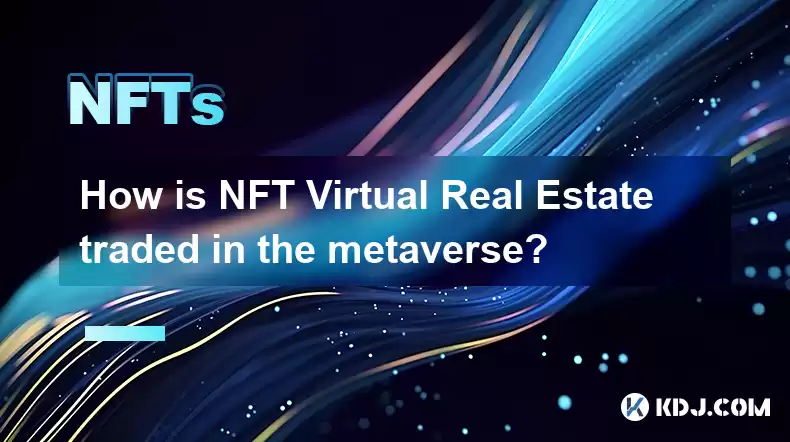
Key Points:
- NFT virtual real estate trading in the metaverse operates similarly to traditional real estate, but utilizes blockchain technology and NFTs for ownership verification.
- Transactions occur on various metaverse platforms and marketplaces, each with its own set of rules and fees.
- Payment methods typically involve cryptocurrencies, with Ethereum being a prevalent choice.
- Understanding the platform's policies, assessing land value, and verifying ownership are crucial aspects of successful trading.
- Legal considerations, particularly regarding jurisdiction and intellectual property, are emerging challenges in this rapidly evolving space.
How is NFT Virtual Real Estate Traded in the Metaverse?
The metaverse, a persistent, shared, 3D virtual world, has seen a surge in interest in virtual real estate represented by NFTs (Non-Fungible Tokens). These NFTs act as proof of ownership for digital land parcels, buildings, or even specific locations within various metaverse platforms. Trading this virtual real estate mirrors traditional property transactions, but with a crucial difference: the entire process is recorded and verified on a blockchain.
Unlike traditional real estate, where deeds are physical documents, NFT virtual real estate ownership is immutably recorded on the blockchain. This transparency adds a layer of security and verifiability not found in the traditional market. However, the lack of established legal frameworks presents unique challenges.
The process of buying and selling NFT virtual real estate typically begins with identifying a suitable platform. Popular metaverses such as Decentraland and The Sandbox offer virtual land for sale. Each platform has its own marketplace or integrated trading system. These marketplaces function similarly to online real estate portals, allowing users to browse available properties, view details, and make offers.
Payment for virtual land is usually conducted using cryptocurrencies, predominantly Ethereum. This aligns with the decentralized nature of the metaverse and the blockchain technology underpinning NFTs. However, some platforms may accept other cryptocurrencies or even fiat currencies, depending on their specific setup.
Before purchasing, thorough due diligence is paramount. Factors influencing the value of virtual real estate include location (proximity to popular areas or landmarks), size, and potential for development. Just like in the physical world, prime locations command higher prices. It's also vital to understand the specific terms and conditions of the platform, including any limitations on development or usage rights.
The actual trading process often involves connecting a cryptocurrency wallet to the chosen marketplace. Once a property is selected, the buyer initiates a transaction, sending the agreed-upon cryptocurrency amount to the seller. Upon successful completion of the transaction, the NFT representing the virtual land is transferred from the seller's wallet to the buyer's wallet, formally transferring ownership.
The security and verification of these transactions are key aspects of the process. The immutability of blockchain technology ensures that ownership changes are transparent and auditable. However, users should still exercise caution and ensure they are using reputable marketplaces and wallets to minimize the risk of scams or fraud.
Beyond the basic buying and selling, there are also more complex trading strategies. Some investors may choose to lease their virtual land to others, generating passive income. Others may develop their land by building virtual structures or creating immersive experiences, thereby increasing its value.
Common Questions and Answers:
Q: Are there any risks involved in trading NFT virtual real estate?
A: Yes, several risks exist. Market volatility, platform-specific rules, and the lack of established legal frameworks pose challenges. Scams and fraudulent activities are also concerns. Thorough research and due diligence are crucial.
Q: What are the legal implications of owning NFT virtual real estate?
A: The legal landscape surrounding NFT virtual real estate is still developing. Issues related to jurisdiction, intellectual property rights, and taxation are yet to be fully addressed. It’s advisable to consult with legal professionals specializing in this emerging area.
Q: How does the value of NFT virtual real estate fluctuate?
A: The value of NFT virtual real estate is influenced by factors like location, platform popularity, utility, development potential, and overall market sentiment for cryptocurrencies and the metaverse. It's a volatile market susceptible to speculation.
Q: What platforms are popular for trading NFT virtual real estate?
A: Decentraland and The Sandbox are two prominent examples. Others are emerging, and each platform offers unique characteristics and opportunities. Research is crucial to find the best fit for your investment strategy.
Q: Can I build on my NFT virtual real estate?
A: Building possibilities vary depending on the platform and the specific terms of the land purchase. Some platforms allow for extensive development, while others have restrictions. Always check the platform's guidelines before investing.
Q: What if the metaverse platform shuts down?
A: This is a significant risk. The value of your NFT could diminish or become worthless if the platform ceases operation. Choosing established and reputable platforms can help mitigate this risk, but it's still a consideration.
Q: How do I choose a reputable marketplace?
A: Look for established marketplaces with a strong track record, positive user reviews, and robust security measures. Be wary of platforms offering unrealistically high returns or those with opaque operations.
Q: What are the long-term prospects for NFT virtual real estate?
A: The long-term potential is uncertain. While the metaverse is growing, its future trajectory is subject to various factors, including technological advancements, regulatory changes, and broader market trends. Investment should be approached with caution and diversification.
Q: Are there taxes involved in NFT virtual real estate transactions?
A: Tax implications vary depending on your location and the specifics of the transaction. Consult a tax professional to understand your obligations. Tax laws surrounding cryptocurrencies and NFTs are still evolving globally.
Disclaimer:info@kdj.com
The information provided is not trading advice. kdj.com does not assume any responsibility for any investments made based on the information provided in this article. Cryptocurrencies are highly volatile and it is highly recommended that you invest with caution after thorough research!
If you believe that the content used on this website infringes your copyright, please contact us immediately (info@kdj.com) and we will delete it promptly.
- Cryptocurrency, Altcoins, and Profit Potential: Navigating the Wild West
- 2025-08-04 14:50:11
- Blue Gold & Crypto: Investing Disruption in Precious Metals
- 2025-08-04 14:30:11
- Japan, Metaplanet, and Bitcoin Acquisition: A New Era of Corporate Treasury?
- 2025-08-04 14:30:11
- Coinbase's Buy Rating & Bitcoin's Bold Future: A Canaccord Genuity Perspective
- 2025-08-04 14:50:11
- Coinbase's Buy Rating Maintained by Rosenblatt Securities: A Deep Dive
- 2025-08-04 14:55:11
- Cryptos, Strategic Choices, High Returns: Navigating the Meme Coin Mania
- 2025-08-04 14:55:11
Related knowledge
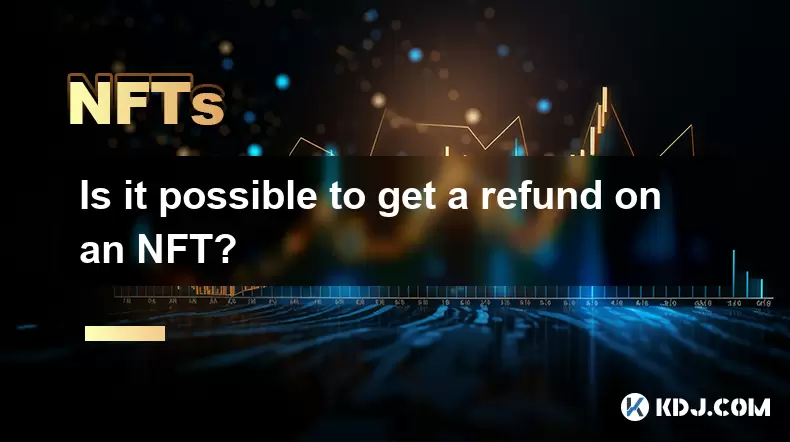
Is it possible to get a refund on an NFT?
Jul 21,2025 at 08:35pm
Understanding NFT Transactions and RefundsWhen you purchase an NFT (Non-Fungible Token), the transaction is typically recorded on a blockchain, making...
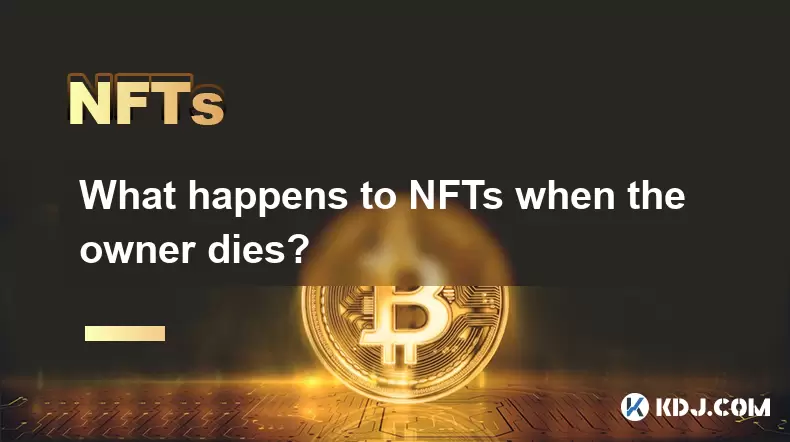
What happens to NFTs when the owner dies?
Jul 22,2025 at 02:43pm
Legal Ownership and Digital AssetsWhen an individual owns NFTs, the question of what happens to these assets upon their death is a pressing one. NFTs ...
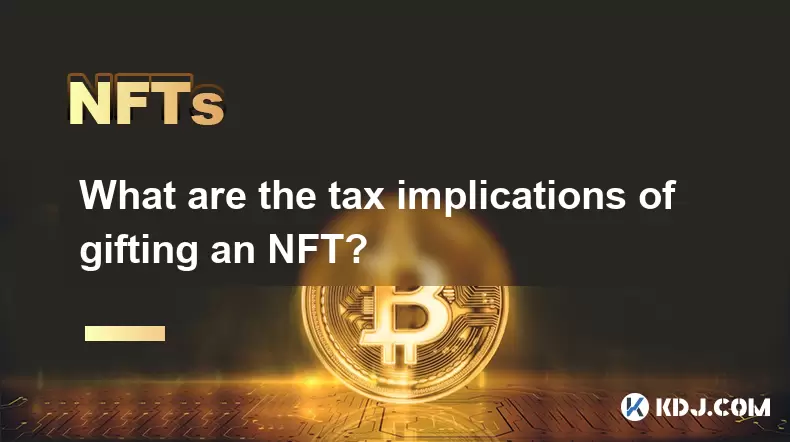
What are the tax implications of gifting an NFT?
Jul 19,2025 at 04:21am
Understanding the Basics of NFT GiftingGifting a Non-Fungible Token (NFT) involves transferring ownership from one individual to another without recei...
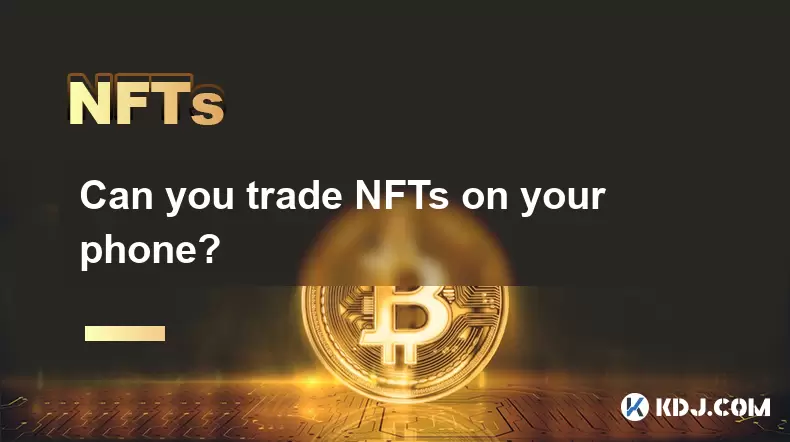
Can you trade NFTs on your phone?
Jul 18,2025 at 04:29am
Trading NFTs on Mobile DevicesYes, you can trade NFTs on your phone, and the process has become increasingly streamlined thanks to a variety of mobile...
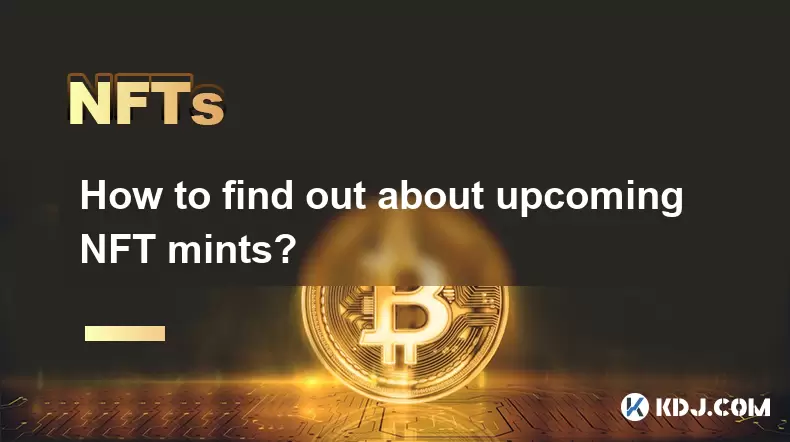
How to find out about upcoming NFT mints?
Jul 18,2025 at 11:50am
Exploring NFT Minting OpportunitiesUnderstanding the landscape of upcoming NFT mints is crucial for collectors, investors, and creators who wish to st...
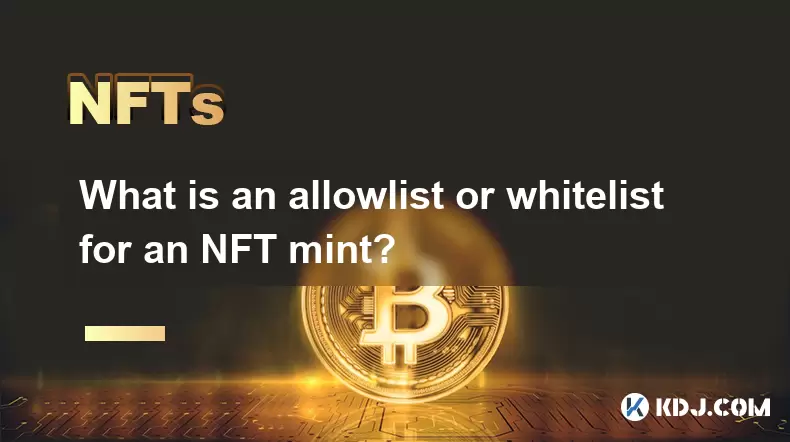
What is an allowlist or whitelist for an NFT mint?
Jul 20,2025 at 07:14pm
Understanding the Concept of an Allowlist for NFT MintingAn allowlist, also commonly referred to as a whitelist, is a mechanism used in the NFT mintin...

Is it possible to get a refund on an NFT?
Jul 21,2025 at 08:35pm
Understanding NFT Transactions and RefundsWhen you purchase an NFT (Non-Fungible Token), the transaction is typically recorded on a blockchain, making...

What happens to NFTs when the owner dies?
Jul 22,2025 at 02:43pm
Legal Ownership and Digital AssetsWhen an individual owns NFTs, the question of what happens to these assets upon their death is a pressing one. NFTs ...

What are the tax implications of gifting an NFT?
Jul 19,2025 at 04:21am
Understanding the Basics of NFT GiftingGifting a Non-Fungible Token (NFT) involves transferring ownership from one individual to another without recei...

Can you trade NFTs on your phone?
Jul 18,2025 at 04:29am
Trading NFTs on Mobile DevicesYes, you can trade NFTs on your phone, and the process has become increasingly streamlined thanks to a variety of mobile...

How to find out about upcoming NFT mints?
Jul 18,2025 at 11:50am
Exploring NFT Minting OpportunitiesUnderstanding the landscape of upcoming NFT mints is crucial for collectors, investors, and creators who wish to st...

What is an allowlist or whitelist for an NFT mint?
Jul 20,2025 at 07:14pm
Understanding the Concept of an Allowlist for NFT MintingAn allowlist, also commonly referred to as a whitelist, is a mechanism used in the NFT mintin...
See all articles

























































































